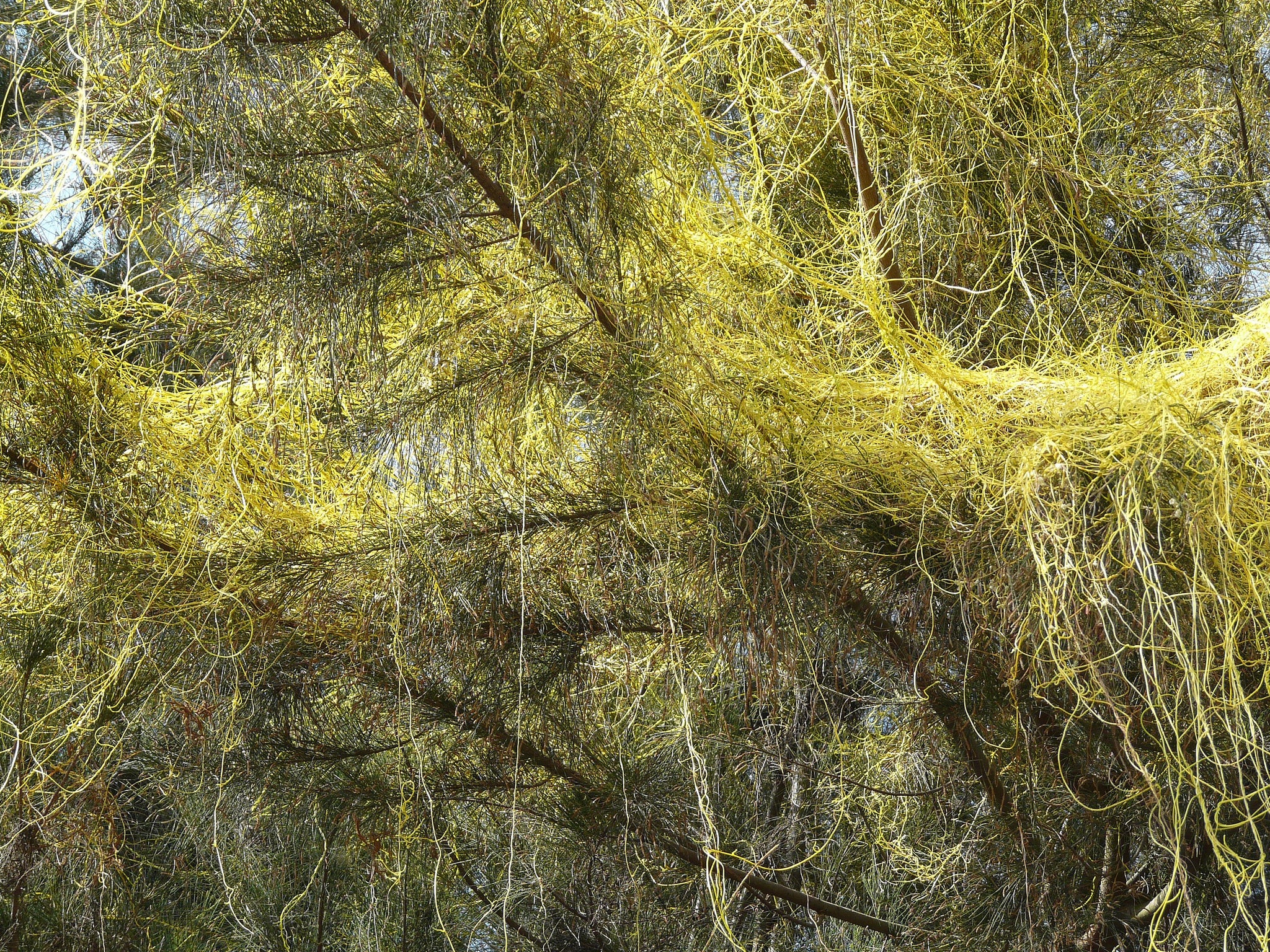This week the Plant Meditation Club meditated with Cuscuta chinensis, 菟丝子, tùsīzǐ, dodder seed, an herb of classical Chinese medicine.
Areas for further exploration:
Dodder seed: how does it support emotional well-being, what are the mechanisms through which it brought us peace and/or reassurance.
Parasitic plants in general: are they specialists in the realm of attachment, detachment, and very close relationships?
Smell
"Stale cornbread", mild smell
Taste
mild, neutral flavor; second steep: sweet like straw, still mild and neutral
Meditatation 1
Me: My energy goes to my left forehead, then right, then center. Then the energy begins to circulate between my heart and high forehead. This is happening at a fairly quick pace, over and over. After a while this regulates to go with my breath: inhale and then energy moves to my heart, exhale and it moves to my high forehead, meaning the top, the inch or so beneath my hairline. Next the energy is in my heart, rotating for a good ten minutes (we didn't hear the timer, so maybe longer, lol).
My daughter: I see water washing down someone's spine, down their bones. I hear the word vertebrae over and over. I hear Applause by Lady Gaga. Zoom in on someone's fingers, I saw the bones. Then water washing down the bones. I think this herb is good for arthritis.
Meditation 2
Me: The energy stays in my heart. The space feels cooler, but not cold and not cool. I may have been warm in that area and became a little less warm. It felt a little like a cool (like room temperature, not cold) wash had come over my heart. The experience was quite simple. By the end I felt at peace.
My daughter: I didn't see much, just a picture of water dousing out a fire and cooling inflammation.

A Parasitic Plant
Cuscuta chinensis is a parasitic plant. In this image you can see how it climbs all over its host. When the meditation was over, after listening to Daughter by Pearl Jam ("don't call me dodder"), my daughter was acting suprisingly like Tùsīzǐ, clinging to me so closely I could barely get out of her grip. We are huggy but this was extra! After reading a little about the plant it makes more sense and is making me smile instead of being confused. This is the second parasitic plant I have connected to, the other being mistletoe. I am interested to explore type of plant more. Maybe they both know hug medicine (although the tree above looks like it is being hugged to death). They both brought peace.
Summary
This herb brought up two themes. One was around bone health, cooling inflammation, and bones. The other, around emotional shifts and support warrants further exploration.
Emotions: This herb is often used as an adaptogen, to help the body manage stress. Since it supports the liver and kidneys, both organs that process toxins, it would feel affirming and help feel stronger again. I can't help but thinking of the near death-grip this plant appears to have on its hosts (especially having experienced it briefly with my daughter! I was having a hard time moving.). There is no advantage to dodder to kill its host, but it can weaken the host, or reduce "productivity". Science doesn't seem to have determined any benefit for the host plant, so dodder is considered a true parasite. As usual the scientists have ignored dodder's continuous hugs, all over, all the time--that's moral support people! This is classic underappreciation of emotional labor, lmao.

Per the Divine Farmer's Classic of Materia Medica, Shén Nóng Běncǎo Jīng (Wilms, 2017, p 44) this herb is "indicated for reconnecting damage from severance". It is considered an important herb for "calm the fetus" in cases of threatened or repeated miscarriage. (Bensky, Chinese Herbal Medicine Materia Medica, Eastland Press, 1986, p 505).
Arthritis: This herb is currently used for pain, inflammation, and various effects of aging including arthritis and osteoporosis. Here is a study illuminating how it helps with gluco-corticoid induced osteoporosis. And another study showing it improving osteoporosis caused by estrogen deficiency (in rats). The washing vision (water washing over bones and heart) is interesting. This herb is considered "acrid, sweet, and neutral". Neutral means the herb is neither stronger cooling nor strongly heating. It is interesting that visions included washing with water, which sounds cooling, and the experience of comforting warmth. I wonder if this is in line with the neutral quality since they were not major changes in temperature. I can't see how something that improves inflammation wouldn't be mildly cooling at least.
Vision: Dodder seed is also used for vision problems too (associated with the liver), which is perhaps related to activation of forehead in my case, as I am having ongoing vision issues related to a concussion. The experience I had seemed related to healing the injury. Thanks dodder :)
Traditional Use
Traditionally Tùsīzǐ was used in Chinese medicine to tonify the kidneys (which relate to the bones), deficient liver (relates to emotions like frustration and initiative) and deficient essence (it nourishes vital energy). The kidneys are associated with the emotions of disproportionate fear and realistic optimism. This herb is primarily used for anti aging and osteoporosis, and both male reproductive health (erectile dysfunction, nocturnal emission, sterility), and regulation of reproductive hormones in women. Generally improving endurance and sexual functioning, it is also considered an aphrodisiac.
Modern Use
Classical Chinese medicine does not discuss the brain very much. Cuscuta may be helpful for neurogenesis and be neuroprotective. Studies on neurodegenerative diseases like Parkinson's and Alzheimer's indicate it's capacity to improve damage to the brain.
What were your experiences with Dodder seed?
I loved learning about Tùsīzǐ, Cuscuta chinensis. It felt pretty subtle at the time but now seems complex and is making me very curious. While some argue it gives nothing to its host plant--harvesting keeps the host plant healthy and gives us medicine. Some of my favorite herbs are the most sustainable because they are overgrowing in their environment. They know how to live and using them helps restore balance. If you have experience with this herb, either personally or clinically, please share in the comments below.
Mistletoe is an herb I appreciate for comfort after miscarriages. I am curious about the wisdom of parasite plants in understanding clinging together and healing from very close connections. If you know more about parasitic plant medicine, I would love to hear!
